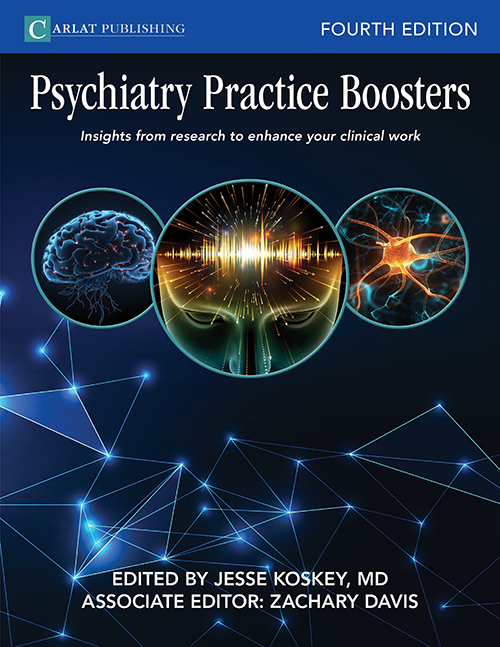Home » Transcranial Magnetic Stimulation (TMS) for Depression in Children and Adolescents
Transcranial Magnetic Stimulation (TMS) for Depression in Children and Adolescents

June 11, 2019
From The Carlat Child Psychiatry Report
Editor’s note: This article is about the “usual” TMS that we have been hearing about for many years. We are covering trigeminal nerve stimulation (eTNS) separately in this issue in a News of Note as it is far newer with far less clarity about its utility.
The search for safer treatment
With concerns about both safety and efficacy surrounding antidepressant use in children and adolescents, we are always looking for safer, effective treatments for our patients. TMS has been around since 2008, and its use in youth is expanding. But what is the evidence supporting its use? Is this more a matter of marketing than science? And are there side effects we should worry about?
What is TMS?
TMS is a noninvasive neuromodulation therapy in which a magnet, similar in strength to a magnetic resonance imaging (MRI) machine, is applied to the scalp. Nerve cells in areas of the brain controlling mood are then activated by magnetic pulses. The claim is that these pulses can affect the brain’s neurotransmitter levels and correct dysfunctional brain pathways. Patients remain awake during the procedure, and unlike ECT, TMS does not induce a seizure. Because a strong magnet is used, TMS is contraindicated in patients who have metallic objects or implanted stimulator devices in or near their head.
Does it work?
Studies on the use of TMS in adults with depression have been promising, though not spectacular. The FDA has approved its use for treatment-resistant depression, migraines, and obsessive-compulsive disorder.
Research in children and adolescents, meanwhile, is unfortunately lacking and consists almost entirely of case reports and open-label studies. The only randomized controlled trial involved just 2 patients! The available reports include a total of 112 patients, mean ages 11–21 years. Most of the youths had treatment-resistant depression, and more than half responded to TMS (Croarkin PE et al, Child Adolesc Psychiatric Clin N Am 2019;28(1):33–43). Since the majority of studies involved older adolescents and young adults, it is unknown if TMS is as effective for depression in children and younger adolescents.
The largest, and most recent, trial by MacMaster and colleagues included 32 outpatients with moderate to severe treatment-resistant depression, ages 13–21 years. Patients underwent a 3-week, open-label trial of TMS. The primary outcome measure was change in Hamilton Depression Rating Scale scores. There were 18 (56%) responders, with 14 (44%) achieving remission. No serious adverse events were noted. The most common side effects were mild to moderate headaches (19%) and mild neck pain (16%). The compliance rate with treatment was 99% (MacMaster FP et al, Front Psychiatry 2019;10(article 170);1–6). A larger randomized controlled trial of TMS is in progress and will conclude in December 2019 (https://clinicaltrials.gov/ct2/show/NCT01804270).
Treatment protocols
Since TMS is not FDA-approved for depression in children and adolescents, a standardized protocol has not been established. In the MacMaster study, TMS was applied at 10 Hz with each run consisting of 40 pulses at 120% the resting motor threshold over 4 seconds. Treatment sessions lasted 37.5 minutes with 75 runs/3,000 pulses. Patients received TMS every weekday for 3 weeks, 15 days in total (MacMaster FP et al, Front Psychiatry 2019;10(article 170);1–6). In other studies, the average duration of treatment has been 6 weeks/30 sessions.
Is it safe?
While the research is limited, TMS is apparently safe for use in children and adolescents. Krishnan et al conducted a meta-analysis that included data from 48 studies involving more than 513 youths, ages 2.5–17.8 years. Side effects were mild and transient. The most common were headache (11.5%), scalp discomfort (2.5%), and twitching (1.2%) (Krishnan et al, Brain Stimulation 2015;8(1):76–87). There are a few case reports of TMS inducing seizures, syncope, or hypomania.
In terms of cognitive effects, preliminary findings in older adolescents suggest TMS doesn’t adversely alter cognitive functioning and may provide modest improvement of verbal memory (Wall CA et al, Front Psychiatry 2013;4(article 165):1–8). An unanswered yet critical question is the long-term effect of TMS as a neuromodulatory treatment on the developing brains of children and young adolescents.
Logistics
Typical costs for TMS are $300–$500 per session. Multiplied by 5 sessions a week for the first 4–6 weeks, the price tag can be anywhere from $6,000 to $15,000 (https://www.medpagetoday.com/psychiatry/depression/56168). By comparison, ECT costs about twice as much per session, while medications and therapy typically cost much less over similar time periods. Still, it is not uncommon to hear recommendations for extended TMS treatment, which may, like extended medication and therapy, result in fairly similar raw costs. However, with FDA approval only for adults 18 and older, insurance coverage for TMS in children and adolescents is nonexistent.
In this age of poor reimbursement and high overhead, many providers consider providing TMS. Costs of machines range from $50,000 to more than $100,000. However, machines can be leased for as low as $900/month (https://mycloudtms.com/tms-machine). Some factors to consider in setting up a TMS practice include staffing and space: A standard-sized room, 12 x 15 feet, is needed. No special shielding is necessary, but the machine must be operated by a trained medical professional. Ethical issues include how one markets and how one provides truly informed consent in an off-label TMS clinic—particularly in light of the scant research and unclear potential risks in children.
CCPR Verdict: While the long-term impact of TMS on people, especially children, is unknown, in short-term use TMS is probably safe for teens, although headaches may pose a limiting factor for some patients. However, efficacy is unclear, and the cost and time required for treatment are important considerations. Specific medications such as fluoxetine and therapies such as CBT have better research to support their use in depression in children and teens, but TMS may be a helpful option in cases where those modalities have failed or are less palatable to families, as well as an adjunctive treatment.
Child PsychiatryThe search for safer treatment
With concerns about both safety and efficacy surrounding antidepressant use in children and adolescents, we are always looking for safer, effective treatments for our patients. TMS has been around since 2008, and its use in youth is expanding. But what is the evidence supporting its use? Is this more a matter of marketing than science? And are there side effects we should worry about?
What is TMS?
TMS is a noninvasive neuromodulation therapy in which a magnet, similar in strength to a magnetic resonance imaging (MRI) machine, is applied to the scalp. Nerve cells in areas of the brain controlling mood are then activated by magnetic pulses. The claim is that these pulses can affect the brain’s neurotransmitter levels and correct dysfunctional brain pathways. Patients remain awake during the procedure, and unlike ECT, TMS does not induce a seizure. Because a strong magnet is used, TMS is contraindicated in patients who have metallic objects or implanted stimulator devices in or near their head.
Does it work?
Studies on the use of TMS in adults with depression have been promising, though not spectacular. The FDA has approved its use for treatment-resistant depression, migraines, and obsessive-compulsive disorder.
Research in children and adolescents, meanwhile, is unfortunately lacking and consists almost entirely of case reports and open-label studies. The only randomized controlled trial involved just 2 patients! The available reports include a total of 112 patients, mean ages 11–21 years. Most of the youths had treatment-resistant depression, and more than half responded to TMS (Croarkin PE et al, Child Adolesc Psychiatric Clin N Am 2019;28(1):33–43). Since the majority of studies involved older adolescents and young adults, it is unknown if TMS is as effective for depression in children and younger adolescents.
The largest, and most recent, trial by MacMaster and colleagues included 32 outpatients with moderate to severe treatment-resistant depression, ages 13–21 years. Patients underwent a 3-week, open-label trial of TMS. The primary outcome measure was change in Hamilton Depression Rating Scale scores. There were 18 (56%) responders, with 14 (44%) achieving remission. No serious adverse events were noted. The most common side effects were mild to moderate headaches (19%) and mild neck pain (16%). The compliance rate with treatment was 99% (MacMaster FP et al, Front Psychiatry 2019;10(article 170);1–6). A larger randomized controlled trial of TMS is in progress and will conclude in December 2019 (https://clinicaltrials.gov/ct2/show/NCT01804270).
Treatment protocols
Since TMS is not FDA-approved for depression in children and adolescents, a standardized protocol has not been established. In the MacMaster study, TMS was applied at 10 Hz with each run consisting of 40 pulses at 120% the resting motor threshold over 4 seconds. Treatment sessions lasted 37.5 minutes with 75 runs/3,000 pulses. Patients received TMS every weekday for 3 weeks, 15 days in total (MacMaster FP et al, Front Psychiatry 2019;10(article 170);1–6). In other studies, the average duration of treatment has been 6 weeks/30 sessions.
Is it safe?
While the research is limited, TMS is apparently safe for use in children and adolescents. Krishnan et al conducted a meta-analysis that included data from 48 studies involving more than 513 youths, ages 2.5–17.8 years. Side effects were mild and transient. The most common were headache (11.5%), scalp discomfort (2.5%), and twitching (1.2%) (Krishnan et al, Brain Stimulation 2015;8(1):76–87). There are a few case reports of TMS inducing seizures, syncope, or hypomania.
In terms of cognitive effects, preliminary findings in older adolescents suggest TMS doesn’t adversely alter cognitive functioning and may provide modest improvement of verbal memory (Wall CA et al, Front Psychiatry 2013;4(article 165):1–8). An unanswered yet critical question is the long-term effect of TMS as a neuromodulatory treatment on the developing brains of children and young adolescents.
Logistics
Typical costs for TMS are $300–$500 per session. Multiplied by 5 sessions a week for the first 4–6 weeks, the price tag can be anywhere from $6,000 to $15,000 (https://www.medpagetoday.com/psychiatry/depression/56168). By comparison, ECT costs about twice as much per session, while medications and therapy typically cost much less over similar time periods. Still, it is not uncommon to hear recommendations for extended TMS treatment, which may, like extended medication and therapy, result in fairly similar raw costs. However, with FDA approval only for adults 18 and older, insurance coverage for TMS in children and adolescents is nonexistent.
In this age of poor reimbursement and high overhead, many providers consider providing TMS. Costs of machines range from $50,000 to more than $100,000. However, machines can be leased for as low as $900/month (https://mycloudtms.com/tms-machine). Some factors to consider in setting up a TMS practice include staffing and space: A standard-sized room, 12 x 15 feet, is needed. No special shielding is necessary, but the machine must be operated by a trained medical professional. Ethical issues include how one markets and how one provides truly informed consent in an off-label TMS clinic—particularly in light of the scant research and unclear potential risks in children.
CCPR Verdict: While the long-term impact of TMS on people, especially children, is unknown, in short-term use TMS is probably safe for teens, although headaches may pose a limiting factor for some patients. However, efficacy is unclear, and the cost and time required for treatment are important considerations. Specific medications such as fluoxetine and therapies such as CBT have better research to support their use in depression in children and teens, but TMS may be a helpful option in cases where those modalities have failed or are less palatable to families, as well as an adjunctive treatment.
KEYWORDS adolescents brain_devices children depression free_articles pediatric safety teens tms transcranial-magnetic-stimulation
Issue Date: June 11, 2019
Table Of Contents
Recommended
Newsletters
Please see our Terms and Conditions, Privacy Policy, Subscription Agreement, Use of Cookies, and Hardware/Software Requirements to view our website.
© 2025 Carlat Publishing, LLC and Affiliates, All Rights Reserved.


_-The-Breakthrough-Antipsychotic-That-Could-Change-Everything.jpg?1729528747)



